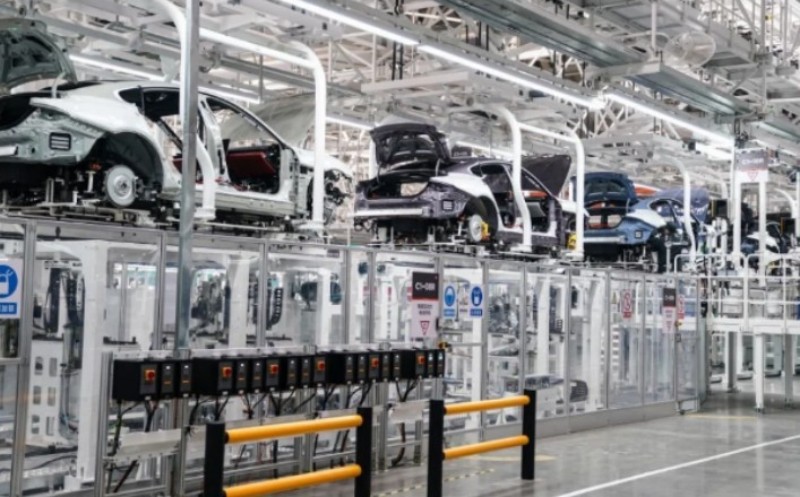In a major development, the European Union has imposed tariffs on electric vehicle imports from China, a move that has triggered strong opposition from various stakeholders in Germany. Germany’s auto industry, a cornerstone of the German economy, condemned the EU’s decision, saying it was a negative blow to its industry. Hildegard Muller, chairman of the German Automobile Manufacturers Association, expressed dissatisfaction with this, saying that tariffs are a setback for global free trade and may have an adverse impact on European economic prosperity, employment and growth. Mueller stressed that imposing these tariffs could exacerbate trade tensions and ultimately harm the auto industry, which is already dealing with weak demand in Europe and China.
Germany’s opposition to tariffs is underlined by its large contribution to the national economy (about 5% of GDP). The German auto industry has been facing challenges such as falling sales and increasing competition from Chinese manufacturers. In early October, Germany voted against the EU’s decision to impose tariffs, reflecting a unified stance among industry leaders who believe trade disputes should be resolved through dialogue rather than punitive measures. Muller called on governments to enhance Germany’s international competitiveness, promote market diversification, encourage innovation, and ensure that Germany continues to play a key role in the global automotive field.
Adverse consequences of imposing tariffs
The imposition of tariffs on Chinese electric vehicles is expected to have some adverse consequences, not only for the German auto industry but also for the wider European market. Ferdinand Dudenhofer, director of the German Automotive Research Center, emphasized that German electric vehicles face major challenges in penetrating the Chinese market. He believes the strategy should focus on developing and producing electric vehicles in China. However, the newly imposed tariffs undermine the economies of scale that German automakers need to compete effectively.
Critics of the EU decision say the tariffs artificially raise the price of electric vehicles, which are already more expensive than conventional gasoline-powered cars. Such price increases could scare away price-conscious consumers and make it harder for European countries to meet their climate goals. Additionally, automakers could face carbon emissions fines if they fail to meet EV sales targets, further complicating the situation. Dudenhoeffer also warned that China may also impose tariffs on conventional fuel-burning vehicles imported from Europe. This could deal a major blow to German automakers already struggling with market dynamics.
Michael Schumann, chairman of the German Federal Association for Economic Development and Foreign Trade, also expressed the same view in an interview with Xinhua News Agency. He expressed his opposition to punitive tariffs and believed that they were not in the interests of the European people. Schumann stressed that the transition to electrification is crucial to combating climate change and should be supported, not hindered, by trade barriers. Imposing tariffs could ultimately jeopardize progress made in promoting electric vehicles and meeting carbon reduction targets.
Calling for global cooperation on electric vehicles
In view of the challenges posed by the EU’s additional tariffs on Chinese electric vehicles, countries around the world urgently need to take active measures to promote the acceptance and popularization of electric vehicles. A spokesman for the German Economy Ministry reiterated Germany’s commitment to ongoing negotiations between the EU and China and expressed its hope to ease trade tensions through diplomatic channels. The German government recognizes the importance of maintaining open markets, which are vital to its connected economy.
Michael Boss, head of the international department of the Berlin-Brandenburg Automotive Suppliers Association, warned that the EU’s decision could intensify trade disputes and seriously damage global free trade. He believes that tariffs cannot solve the strategic and structural problems facing the European auto industry. On the contrary, they will hinder the promotion of electric vehicles in Germany and Europe and threaten the realization of carbon emission reduction goals.
As the world transitions to a green energy future, countries must cooperate and harness the full potential of electric vehicles, including those produced in China. The integration of Chinese electric vehicles into the global market can make a significant contribution to energy conservation and emission reduction. By fostering an environment of cooperation and dialogue, countries can work together to create a sustainable future that is good for the economy and the environment. The call for unity to promote electric vehicles is not just a trade issue; This is a critical step towards meeting global climate goals and ensuring a healthier planet for future generations.
Email: edautogroup@hotmail.com
WhatsApp: 13299020000
Post time: Nov-07-2024





